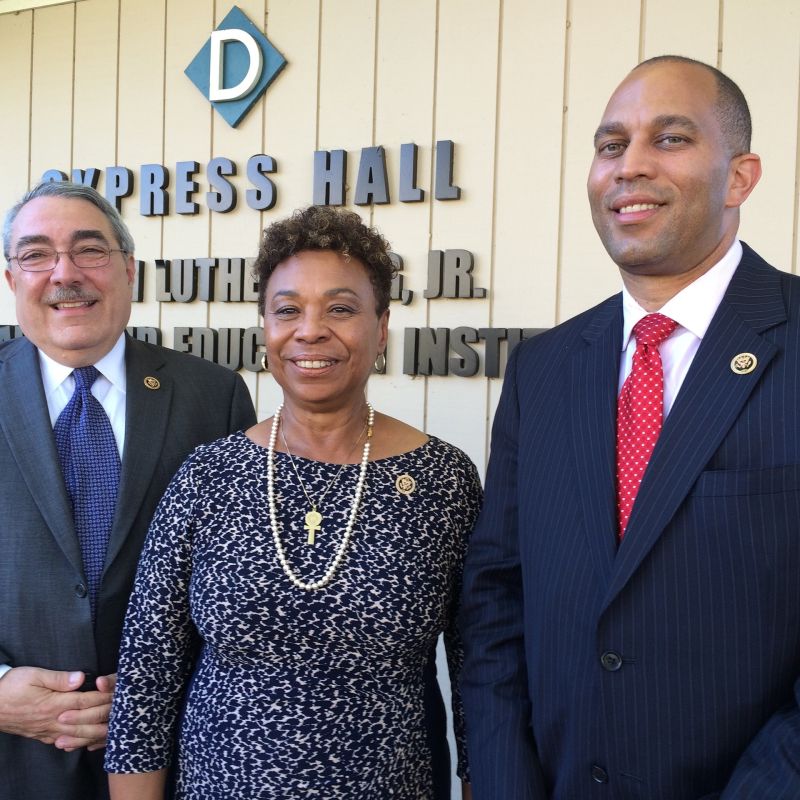The earlier days of tech companies not needing Washington, D.C., are over, and today most have armies of lobbyists in the nation's capital.
"Many of these companies have issues before the Congress of the United States, and the relationship needs to be one of partnerships," said Jeffries. "We're open to hearing the issues that they need to get resolved in order to put their businesses in the best possible position to be successful, but we want to make sure that everyone in this country has the opportunity to robustly pursue the American Dream."
Butterfield added that technology companies are also federal contractors.
"And as such they have a responsibility first of all to be accountable to the federal government and also to be diverse in their workforce. We're going to continue to challenge these companies until they get parity," said Butterfield.
Yolanda Mangolini, Google's director of diversity and inclusion, issued a statement saying: "We look forward to continuing conversations we've had in Washington with the Congressional Black Caucus and we welcome their visit. We share their commitment to enhancing the diversity of our organization and the tech industry more broadly."
By email an Apple spokeswoman said, "We believe diversity is critical to making the best products in the world. It's the reason we're focused on changing the pipeline for the future workforce with programs like ConnectEd and also working to find the most diverse talent with programs like National Center for Women & Information Technology and Thurgood Marshall College Fund. We look forward to continuing our work with the Congressional Black Caucus towards our shared goal of equal access to opportunities in technology."
Intel spokeswoman Lisa Malloy sent an email saying, "Intel executives, including CEO Brian Krzanich, were honored to host members of the Congressional Black Caucus (CBC) at our headquarters in Santa Clara for a candid discussion about diversity in tech, a tour and an Internet of Things technology demonstration."
In January, Krzanich set a bold hiring and retention goal to achieve full representation of women and underrepresented minorities at Intel by 2020. This effort is aligned with the CBC’s new initiative aimed at increasing African-American representation and inclusion in the technology industry.
"We continue to roll our programs that build on Intel’s Diversity in Technology Initiative," Malloy said. "Last month, Intel announced the $125 million Intel Capital Diversity Fund, investing in technology startups run by women and underrepresented minorities."
And today, in conjunction with the White House Demo Day focused on inclusion, Intel announced it will invest $5 million over the next five years to deepen its engineering pipeline partnership with the Georgia Institute of Technology and deploy research-driven solutions to inspire and retain women and underrepresented minorities to start and complete computer science and engineering degrees.
Dr. Clarence B. Jones, a diversity scholar and visiting professor at UCSF, said he has less hope about what Silicon Valley companies will do but would like to be proven wrong.
"It has to do with this systemic problem of not providing proper education at the beginning of the pipeline, not the end of the pipeline," said Jones. "The fundamental issue is the African-American communities today in California and nationwide are in economic crisis. And there is an educational crisis."
Jones believes the companies need to have a joint venture with some schools, which will enable meaningful education starting with the pre-kindergarten level.
Lee agreed, saying Tech 2020 wants an investment commitment.
"Some companies are investing in historically black colleges and universities and minority-serving institutions," said Lee. "But we believe the investment needs to be more robust and we need to do more."
Butterfield said some companies are starting to institute a rule requiring that at least one minority candidate for open positions is considered. It is similar to the "Rooney Rule" the National Football League used to increase diversity of the teams' coaching staffs.
"But as one or two companies pointed out, it's just not getting an African-American before the screening committee," he said. "It's about the screening committee making sure they have the right sensitivity to minorities in their workforce."
All of the caucus members said they are encouraged after the Silicon Valley visit and impressed by the companies' commitment.
"Now that we have a baseline established with the numbers becoming more public and transparent, we can work toward a resolution to get to the finish line," said Jeffries.
